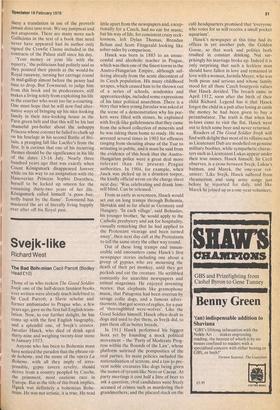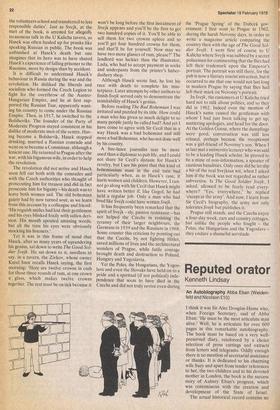Svejk-like
Richard West
The Bad Bohomlan Cecil Parrott (Bodley Head V10) Those of us who reckon The Good Soldier Svejk one of the half-dozen funniest books , ever written were already much indebted to Sir Cecil Parrott, a Slavic scholar and former ambassador to Prague who, a few Years ago, gave us the first full English translation. Now, to our further delight, he has come up with the first English biography, and a splendid one, of Svejk's creator. Jaroslav 'Hasek, who died of drink aged thirty-nine and weighing twenty-four stone in January 1923.
Anyone who has been to Bohemia must have noticed the paradox that the phrase vie de boheme, and the name of the opera La Boheme, with all they imply of irresponsible, gypsy tavern revelry, should derive from a country peopled by Czechs, the primmest, most cautious race in Europe. But as the title of this book implies, Fipek was definitely a bohemian Bohemian. He was not artistic, it is true. He read little apart from the newspapers and, exceptionally for a Czech, had no ear for music, but his way of life, for consistent crazy recklessness, left Dylan Thomas, Brendan Behan and Scott Fitzgerald looking like sober-sides by comparison.
Hasek was born in 1883 to an unsuccessful and alcoholic teacher in Prague, which was then one of the finest towns in the Austro-Hungarian Empire, although suffering already from the acute discontent of its Czech population. His many childhood scrapes, which caused him to be thrown out of a series of schools, academies and apprenticeships, included some expressions of his later political anarchism. There is a story that when young Jaroslav was asked at the scene of a demonstration why his pockets were filled with stones, he explained with Svejk-like guilelessness that they came from the school collection of minerals and he was taking them home to study. He was arrested several times in 1903 for offences ranging from shouting abuse of the Tsar to urinating in public, and it must be said from the evidence of this book that the AustroHungarian police were a great deal more tolerant than the present Prague authorities. In 1904, for example, when Jasek was picked up in a drunken torpor, the kindly official wrote on the charge sheet next day: 'Was celebrating and drank himself blind. Can be released.'
From as early as seventeen, Hasek would set out on long tramps through Bohemia, Slovakia and as far afield as Germany and Hungary. 'In each village', said Bohuslav, his younger brother, 'he would apply to the Catholic presbytery and ask for hospitality, casually remarking that he had applied to the Protestant vicarage and been turned away', then next day call at the Protestants to tell the same story the other way round.
Out of these long tramps and innumerable odd encounters came Hasek's first newspaper stories including one about a group of gypsies who are mourning the death of their pet monkey, until they get peckish and eat the creature. He scribbled constantly for anarchist newspapers and animal magazines. He enjoyed inventing stories: that elephants like gramophone music, that Patagonia had been overrun by savage collie dogs, and a famous advertisement, that got scores of replies, for a pair of 'thoroughbred were-wolves'. Like the Good Soldier himself, Hasek often dealt in dogs and used to dye them, as Svejk did, to pass them off as better breeds.
In 1911 Hasek performed his biggest hoax yet by founding a mock political movement — the 'Party of Moderate Prog ress within the Bounds of the Law', whose platform satirised the pomposities of the real parties. Its main policies included the nationalisation of sextons, and a law to prevent noble creatures like dogs being given the names of tyrants like Nero or Caesar. At party meetings it cost half a litre of beer to ask a question; rival candidates were freely accused of crimes such as murdering their grandmothers; and the placard stuck on the café headquarters promised that 'everyone who votes for us will receive a small pocket aquarium'.
Hasek's newspaper at this time had its offices in yet another pub, the Golden Goose, so that work and politics both resulted in constant drinking. Nut surprisingly his marriage broke up. Indeed it is only surprising that such a feckless man should have fallen in love and remained in love with a woman, Jarmila Mayer, who was both pious and serious and whose family stood for all those Czech bourgeois values that Hasek derided. The breach came in April 1912, soon after the birth of their child Richard. Legend has it that Hasek forgot the child in a pub after losing at cards the money he had been given to buy a perambulator. The truth is that when his in-laws came to visit the flat, Hasek went out to fetch some beer and never returned.
Readers of The Good Soldier Svejk will find with delight that most of its villains such as Lieutenant Dub are modelled on genuine military boobies, while sympathetic characters such as Lieutenant Lukas appear under their true names. Hasek himself, Sir Cecil observes, is a cross between Svejk, Lukas's batman, and Marek, the one-year volunteer: 'Like Svejk, Hasek suffered from rheumatism and sang army songs just before he reported for duty, and like Marek he joined up as a one-year volunteer, the volunteers school and transferred to less responsible duties'. Just as Svejk, at the start of the book, is arrested for allegedly treasonous talk in the U Kalicha tavern, so Hasek was often hauled up for pranks like speaking Russian in public. The book was unfinished at Hasek's death but one imagines that its hero was to have shared Hasek's experience of falling prisoner to the Russians, more by design than by accident.
It is difficult to understand Hasek's behaviour in Russia during the war and the revolution. He disliked the liberals and socialists who formed the Czech Legion to fight for the overthrow of the AustroHungarian Empire, and he at first supported the Russian Tsar, apparently wanting his country to come under the Russian Empire. Then, in 1917, he switched to the Bolsheviks. The founder of the Party of Moderate Progress stayed consistent in his dislike of moderate men of the centre. Having become a Bolshevik, Hasek stopped drinking, married a Russian comrade and went on to become a Commissar, although a lenient one. He returned to Prague after the war, with his bigamous wife, in order to help the revolution.
The revolution did not arrive and Hasek soon fell out both with the comrades and with the Czech authorities who thought of prosecuting him for treason and did in fact prosecute him for bigamy — his death was to leave both women sad. The old bohemian gaiety had by now turned sour, as we learn from this account by a colleague and friend: 'His roguish smiles had lost their gentleness and his eyes blinked foxily with sullen derision. His mouth spouted amusing words, but all the time his eyes were obviously mocking his listeners.'
Yet it was in this frame of mind that Hasek, after so many years of squandering his genius, sat down to write The Good Sol dier Svejk. He sat down to it, needless to say, in a tavern, the Zivkov, whose owner Karel Snor recalls Hasek saying, the first morning: 'Here are twelve crowns in cash for those three rounds of rum, at one crown a glass, which makes twelve crowns together. The rest must be on tick because it won't be long before the first instalment of Svejk appears and you'll be the first to get two hundred copies of it. You'll be able to sell them for two crowns apiece and so you'll get four hundred crowns for them, and that'll be for yourself. Now may we have two more glasses of rum, please?' The landlord was luckier than the illustrator, Lada, who had to accept payment in socks and underpants from the printer's haberdashery shop.
Although Hasek wrote fast, he lost his race with death to complete his mas terpiece. Later attempts by other authors to finish Svejk served only to demonstrate the inimitability of Hasek's genius.
Before reading The Bad Bohemian I was irritated and puzzled by its title. How could a man who has given so much delight to so many people justly be called bad? And yet I have come to agree with Sir Cecil that in a way Hasek was a bad bohemian and still more a bad Bohemian, who has not done well by his country.
A free-lance journalist may be more used than a diplomat to pub life, and I could not share Sir Cecil's distaste for Hasek's revelry, but I see his point that this kind of bohemianism must in the end turn bad particularly when, as in Hasek's case, it hurts women and children. However, I cannot go along with Sir Cecil that Hasek might have written better if, like Gogol, he had held a regular job. Only a man who had lived like Svejk could have written Svejk.
It has frequently been remarked that the spirit of Svejk — sly, passive resistance — has not helped the Czechs in resisting the tyranny of their larger neighbours, the Germans in 1939 and the Russians in 1968. Some counter this criticism by pointing out that the Czechs, by not fighting Hitler, saved millions of lives and the architectural wonders of Prague, while futile courage brought death and destruction to Poland, Hungary and Yugoslavia.
Yet the Poles, the Hungarians, the Yugoslays and even the Slovaks have held on to a pride and a spiritual (if not political) independence that seem to have died in the Czechs and did not truly revive even during the 'Prague Spring' of the Dubcek gov ernment. I first went to Prague in 1962, during the harsh Novotny days, in order to write a magazine article comparing the country then with the age of The Good Soldier Svejk. I went first of courss to U Kalicha where Svejk was nabbed by a secret policeman for commenting that the flies had left their trademark upon the Emperor's portrait. The portrait was still there, for the pub is now a literary tourist attraction, but it occurred to me that one would not last long in modern Prague by saying that flies had left their mark on Novotny's portrait.
In Svejk, the customers at U Kalicha tried hard not to talk about politics, and so they did in 1962. Indeed even the mention of Hasek's name caused the gentleman with whom I had just been talking to get up, muttering apologies, and head for the door.
At the Golden Goose, where the dumplings were good, conversation was still less relaxed, perhaps because the receptionist was a girl-friend of Novotny's son. When I at last met a university lecturer who was said to be a leading Hasek scholar, he proved to be a mine of non-information, a spouter of cautious banalities. Only once did he let slip a bit of the real Svejkian wit, when I asked him if the book was not regarded as rather subversive. Is The Good Soldier Svejk, I asked, allowed to be freely read everywhere? 'Yes, everywhere,' he replied 'except in the army'. And now, I learn from Sir Cecil's biography, the army not only tolerates Svejk but publishes it.
Prague still stands, and the Czechs enjoy a four-day week, cars and country cottages, but unlike the people who fought — the Poles, the Hungarians and the Yugoslays -they endure a shameful servitude.



































 Previous page
Previous page